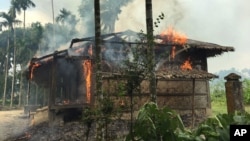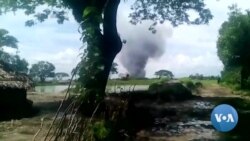The U.S. Holocaust Museum says it has found "compelling evidence of genocide" in Myanmar against the Muslim Rohingya minority, calling on the U.S. government and international governments to hold the Burmese military accountable.
"For the sake of the remnant community of Rohingya still in Burma (Myanmar) and those threatened with being returned, we hope this announcement prods action," Chairman Lee Feinstein of the Museum's genocide watchdog Committee on Conscience said in a statement.
The announcement comes the same day that Public International Law and Policy Group (PILPG), contracted by the U.S. State Department to study the crisis, released a report saying the Myanmar military committed crimes against humanity, genocide and war crimes against the Rohingya.
WATCH: Reports Increase Pressure on US to Change Myanmar Policy
The statements join U.N. investigators, who in August issued a report finding the military had carried out various atrocities against the Rohingya with "genocidal intent."
The U.S. State Department has referred to the military's actions as "ethnic cleansing," but has stopped short of using the term genocide.
"We hope that this leads to a process of review," Naomi Kikoler of the museum's Simon-Skjodt Center for the Prevention of Genocide told reporters during a conference call. "Not just by the U.S. government, but by the international community more broadly."
About 700,000 Rohingya have fled Rakhine state in eastern Myanmar since August 2017, when an attack by Rohingya separatists prompted a brutal military crackdown from the majority-Buddhist country's military that included mass killing of civilians, rape and widespread arson. Most of the refugees have taken shelter in camps in neighboring Bangladesh. The military has justified its actions as necessary to combat terrorism.






